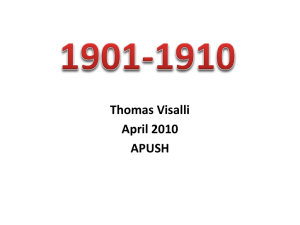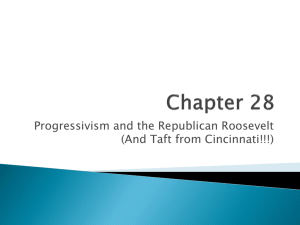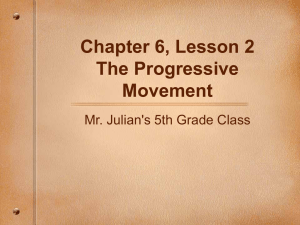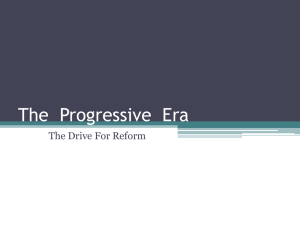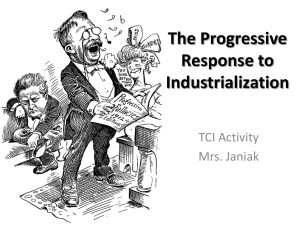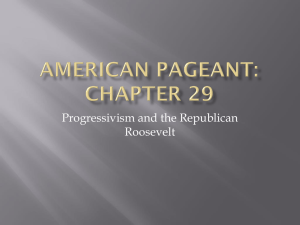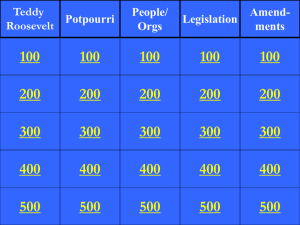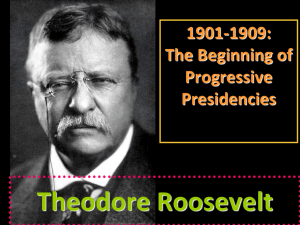Accomplishments of the Progressives
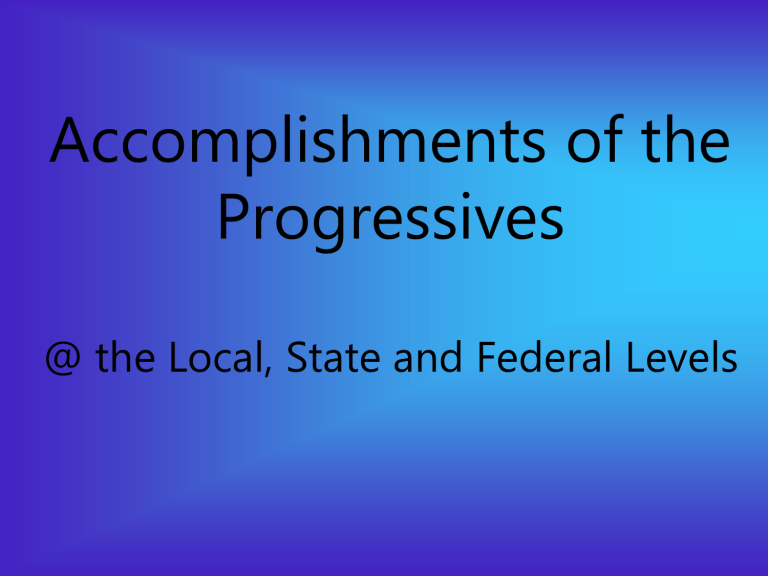
Accomplishments of the
Progressives
@ the Local, State and Federal Levels
1900 to 1917
“Progressives were reformers who attempted to solve problems caused by industry, growth of cities and laissez faire.”
Populists vs Progressives
Populists---rural
Progressives---cities
Populists were poor and uneducated
Progressives were middle-class and educated.
Populists were too radical
Progressives stayed political mainstream.
Populists failed
Progressives succeeded
Progressives were
White Protestants
Middle class and native born.
College Educated Professionals
Social workers
Scholars
Politicians
Preachers
Teachers
Writers
Areas to Reform
Social Justice
Political Democracy
Economic Equality
Conservation
Social Justice
Improve working conditions in industry, regulate unfair business practices, eliminate child labor, help immigrants and the poor
MUCKRAKERS
•Muckrakers were journalists and photographers who exposed the abuses of wealth and power.
•They felt it was their job to write and expose corruption in industry, cities and government.
Progressives exposed corruption but offered no solutions.
Muck raker
Thomas
Nast
Political
Cartoons
Political corruption by
NYC's political machine,
Tammany Hall, led by Boss Tweed.
Tweed was convicted of embezzlement and died in prison.
Jacob
Riis
John
Spargo
How the Other
Half Lives
(1890)
The Bitter Cry of the Children
Living conditions of the urban poor; focused on tenements.
Child labor in the factories and education for children.
NYC passed building codes to promote safety and health.
Ending child labor and increased enrollment in schooling.
Upton
Sinclair
The Jungle
(1906)
Investigated dangerous working conditions and unsanitary procedures in the meat-packing industry.
In 1906 the Meat
Inspection Act and
Pure Food and Drug
Act were passed
Muck raker
Work
Frank
Norris
The Octopus
(1901)
Subject
This fictional book exposed monopolistic railroad practices in
California.
Results
In Northern
Securities v.
U.S.
(1904), the holding company controlling railroads in the
Northwest was broken up.
Ida
Tarbell
"History of
Standard Oil
Company" in
McClure's
Magazine
(1904)
Exposed the ruthless tactics of the Standard Oil
Company through a series of articles published in
McClure's
Magazine .
In Standard Oil v. U.S. (1911), the company was declared a monopoly and broken up.
Upton Beall Sinclair
1906 novel fictitious account of a family of Lithuanian immigrants living in
Chicago and working in the Chicago's Union
Stock Yards.
Exit Questions
• List two things you learned after reading the “Jungle” in class.
• Give an example for the “Jungle” which would support Upton Sinclair advocating for Socialism
• Draw a picture which you think best represents the “Jungle”
Political Democracy
Give the government back to the people, get more people voting and end corruption with political machines.
I. Local Level
• Commission System
• City manager plan
City Reforms
City
Commissioner
Plan
Cities hired experts in different fields to run a single aspect of city government. For example, the sanitation commissioner would be in charge of garbage and sewage removal.
*This could be an elected position
City Manager
Plan
A professional city manager is hired to run each department of the city and report directly to the city council.
II. State Level
•Direct primary
•Initiative
•Referendu m
•Recall
Recall
State Reforms
Allows voters to petition to have an elected representative removed from office.
Initiative
Referendum
Secret Ballot
Direct Primary
Allows voters to petition state legislatures in order to consider a bill desired by citizens.
Allows voters to decide if a bill or proposed amendment should be passed.
Privacy at the ballot box ensures that citizens can cast votes without party bosses knowing how they voted.
Ensures that voters select candidates to run for office, rather than party bosses.
Given out only at the polls
Vote in secret
Printed at public expense
Lists names of all candidates and their parties
Progressive Governor
• Robert M. La Follette –
Wisconsin Idea
– Direct Primary
– Curbed Excess Lobbying
– Commissions in Public
Interest
– Backed Labor reform
Robert M. La Follette
III. Federal Level
• Pure Food and Drug Act
• Meat Inspection Act
• Interstate Commerce
Commission
Amendments
• 16 – Federal Income Tax
• 17 – Direct Election of Senators
• 18- Prohibition
• 19- Women the right to vote
Economic Justice
•Fairness and opportunity in the work world, regulate unfair trusts and bring about changes in labor.
•Demonstrate to the common people that U.S.
Government is in charge and not the industrialists.
Theodore “Teddy” Roosevelt
• Business
– Trust Busting
– Sherman Anti-trust
Act of 1890
– “1902, line against the misconduct not against the wealth”
– “Don’t wish to destroy corp. Wish to serve the public good”
Trust Busting
• Elkins Act (1903).
ended the common practice of the railroads granting rebates to their most valued customers. Trusts paid significantly less for rail service than farmers and other small operators. The law required that rates be published and that violations of the law would find both the railroad and the shipper liable for prosecution.
• Hepburn Act (1906).
The Hepburn Act strengthened existing
• railroad regulations in the following ways:
– Increased the size of the Interstate Commerce Commission from five to seven members
– Gave the ICC the power to establish maximum rates
– Restricted the use of free passes
– Brought other common carriers (businesses that transport goods or information for a fee), such as terminals, storage facilities, pipelines, ferries and others, under ICC jurisdiction
– Required the adoption of uniform accounting practices for all carriers
– In appeals situations, placed the burden of proof on the shipper, not the
ICC; this was a major change from the previous practice in which the railroads had blunted regulations by lengthy appeals.
A 1904 Puck cartoon depicts Theodore Roosevelt as "Jack the Giant-
Killer," battling the Wall Street titans. Actually, Roosevelt “busted” relatively few trusts. His successor, William Taft, dissolved nearly twice as many trusts as Roosevelt. (Scott Foresman Addison Wesley, Picture
Research Dept.)
Muller v. Oregon, (1908)
A landmark decision in United States Supreme Court history, as it justifies both “sex discrimination” and usage of “labor laws.” The case upheld Oregon state restrictions on the working hours of women as justified by the special state interest in protecting women's health. The ruling gave the power to the states to regulate the work place.
Curt Muller, the owner of a laundry business, was convicted of violating
Oregon labor laws by making a female employee work more than ten hours in a single day. Muller was fined $10.
CONSERVATION
Preserve natural resources and the environment
Square deal
“No more, No less”
• Arbitration (UMW)
• Conservation
• Reclamation
• National Park Service
Goodness gracious, I must have been dozing
•Federal Children’s
Bureau
•Creation of a Dept. of
Labor
•8 hr. workday
•Mann-Elkins Act
•Aligns with
Conservative
Republicans and splits with Roosevelt’s
Progressives.
•Dollar Diplomacy
•TR forms his own party called the Progressive “ Bull
Moose Party”……..
The Progressive Party
& Theodore Roosevelt
New Freedom
Goal:
• Favored an active role in economic and social affairs.
• Favored small businesses and the free functioning and unregulated and unmonopolized markets.
• Tackle the “triple wall of privilege ”: the tariff, the banks, and the trusts.
1. Similar to Roosevelt’s
New Nationalism.
New Nationalism
Goal:
• Continuation of his Square
Deal which were reforms to help the common man.
• Favored a more active govt role in economic and social affairs.
1. Good trusts vs. bad trusts
2. Direct election of senators
3. Tariff reduction
4. Presidential primaries
5. Regulation of monopolies
6. End child labor
7. Initiative and referendum
8. Women’s suffrage
GOP Divided by Bull Moose
Equals Democratic Victory!
William Howard Taft Woodrow Wilson
President of the United States
(1909 –1913)
President of the United States
(1913-1921)
